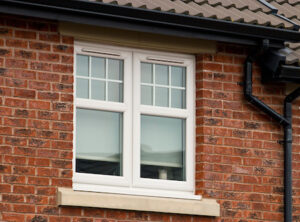
Should You Choose Single Hung or Double Hung Windows for Your Next Build?
When planning a new construction project or updating an existing structure, choosing the right type of windows is crucial for both the aesthetics and functionality of your home. Single hung and double hung windows are popular choices, each offering unique benefits and drawbacks. Understanding the differences between these two types of windows can help you make a more informed decision for your next build. Here’s a detailed look at these two types of windows to help you decide which is best for your upcoming construction project.
Understanding Single Hung and Double Hung Windows
- Single Hung Windows feature a top sash that is fixed in place and a bottom sash that moves vertically. This traditional style is often found in older homes and is favored for its classic appearance and slightly lower cost.
- Double Hung Windows, on the other hand, allow both the top and bottom sashes to move up and down. This not only improves ventilation but also makes cleaning easier, as the sashes can be tilted inward, allowing you to clean the outside glass from inside your home.
Ventilation and Airflow
Ventilation is a key functional aspect to consider. Double hung windows excel in this area because you can open both sashes to create a natural airflow—warm air can escape from the top while cooler air enters through the bottom. This is particularly advantageous in warmer climates or during the summer months. In contrast, single hung windows offer limited ventilation, as only the bottom sash opens.
Maintenance and Cleaning
Maintaining and cleaning your windows is crucial for ensuring they operate efficiently and extend their lifespan. When choosing between single and double hung windows for your home, it’s important to consider the differences in maintenance and cleaning requirements. Here’s a detailed exploration of what each type entails, helping you make an informed decision based on ease of upkeep.

Maintenance Requirements
Single Hung Windows
- Simplicity in Design: Single hung windows have fewer moving parts since only the bottom sash is operable. This simplicity means there are fewer mechanisms that could potentially require repair.
- Longevity: With less mechanical wear and tear, single hung windows can sometimes enjoy a longer lifespan, especially if they are not subjected to frequent operation.
- Periodic Checks: It’s important to periodically check the window tracks and the condition of the seal and caulking. Even though these windows are less complex, they still need regular inspections to ensure that they remain weather-tight and functional.
Double Hung Windows
- More Components: Double hung windows have more moving parts, including two operable sashes. This increases the likelihood of wear and potential issues with balance springs or tilt mechanisms over time.
- Regular Lubrication: The tracks and rollers on double hung windows may require regular lubrication to keep the sashes moving smoothly. This is especially important in climates where dirt and grit can accumulate more readily.
- Component Wear: Due to the additional operational features, components like locks and tilting mechanisms should be checked more frequently to ensure they are working correctly.
Cleaning Considerations
Single Hung Windows
- Cleaning Challenges: Cleaning the exterior of single hung windows, particularly on upper floors, can be more challenging. The top sash does not move, which means you often need to clean it from the outside. This can be inconvenient and sometimes even require hiring professional window cleaners.
- Safety Risks: Especially in multi-story buildings, the need to clean from the outside can pose safety risks unless appropriate safety measures are taken.
Double Hung Windows
- Ease of Cleaning: One of the biggest advantages of double hung windows is their ease of cleaning. Both sashes can tilt inward, allowing you to clean the exterior glass from inside your home. This feature is highly beneficial for windows in hard-to-reach places.
- Regular Maintenance: The mechanisms that allow for tilting need to be kept in good working order. Regularly checking and maintaining these can ensure that the windows continue to function as intended and remain easy to clean.

Choosing Based on Maintenance and Cleaning Needs
The decision between single and double hung windows can significantly affect your maintenance and cleaning routines. If you prioritize low maintenance over time, single hung windows might be the better choice due to their simpler design and fewer moving parts. However, if ease of cleaning is a major concern, especially if your home has multiple stories, double hung windows offer clear advantages.
Additional Tips for Both Window Types
- Regular Inspection: Regardless of the type, regular inspection and maintenance can prevent minor issues from becoming major problems.
- Use Proper Cleaning Supplies: Using non-abrasive cleaners and soft cloths can help prevent scratches and damage to the glass and frames.
- Check Seals and Weather-stripping: This is crucial for maintaining energy efficiency and preventing water damage, no matter which type of window you choose.
Both single and double hung windows have their own set of maintenance and cleaning benefits and challenges. Your choice will depend on what aspects are more important for your lifestyle and your home’s requirements.
Energy Efficiency
The energy efficiency of your windows is another important consideration. Single hung windows generally have an edge here due to fewer moving parts, which minimizes the spaces through which air can escape. However, modern double hung windows are also designed to be highly efficient, featuring improved sealing technologies to reduce air infiltration.
Safety Features
For homes with children, safety can be a concern. Single hung windows are often considered safer because the top sash does not open, reducing the risk of accidents. Double hung windows, while offering more ventilation flexibility, may require additional safety measures such as locks or guards on the upper sash.

Cost Considerations of Single and Double Hung Windows
When planning a construction or renovation project, understanding the cost implications of your window choices is crucial. Single hung and double hung windows are among the most popular window types, but they come with different price tags and long-term cost implications. Here’s a detailed examination of the cost considerations associated with each type of window to help you make an informed financial decision.
Single Hung Windows
- Lower Initial Cost: Generally, single hung windows are less expensive than double hung windows. This cost difference is mainly due to the simpler mechanics involved in single hung windows, which have only one operable sash.
- Installation: The installation costs for single hung windows are typically lower or comparable to those for double hung windows, depending on the complexity of the project and the materials used.
Double Hung Windows
- Higher Initial Cost: Double hung windows typically cost more than single hung windows due to their more complex design. Each window has two operable sashes, requiring additional mechanisms, such as tilting features for easy cleaning.
- Installation Complexity: The installation process for double hung windows can sometimes be more complex due to these additional features, potentially adding to the overall cost.
Choosing Based on Cost Considerations
Choosing between single and double hung windows involves weighing initial costs against long-term value. If upfront cost and lower maintenance are your primary concerns, single hung windows may be the way to go. However, if you are considering long-term energy savings, ease of maintenance, and potential resale value, double hung windows could be worth the extra investment.

Budgeting Tips
- Get Multiple Quotes: Always get multiple quotes for both window types and compare what each installer offers. Prices can vary significantly based on the supplier and the specifics of the installation.
- Consider Total Ownership Costs: Look beyond the purchase price and consider energy savings, maintenance costs, and potential impact on your home’s market value.
Ultimately, the decision between single and double hung windows should align with your financial goals, lifestyle needs, and long-term plans for your property. By understanding the cost implications of each window type, you can make a choice that balances your budget with your expectations for comfort, energy efficiency, and aesthetic appeal.
Aesthetic Appeal
Lastly, consider the architectural style of your home. Single hung windows can maintain the historical integrity of traditional designs, making them ideal for restoration projects or homes in historic districts. Double hung windows offer a versatile look that suits both modern and classic designs, making them a universally appealing option.
Choosing between single hung and double hung windows depends on various factors including your budget, ventilation needs, maintenance preferences, and the architectural style of your home. Double hung windows provide greater convenience and flexibility, making them suitable for those who prioritize ease of maintenance and optimal airflow. Single hung windows, offering a more budget-friendly and historically accurate option, are ideal for those looking to preserve traditional aesthetics while achieving good performance. By carefully considering these aspects, you can select the window type that best fits your needs and enhances your new build.



Leave a Reply